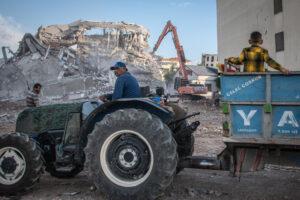Economic recovery means little to Europe’s working poor
Europe is experiencing an economic recovery but many of the jobs being created are keeping people poor rather than lifting them out of poverty.
Friday 8 December 2017
The latest forecasts tell a story of economic recovery. Europe is emerging out of a decade-long slump that nearly crippled a handful of countries and stung employment and growth numbers in the rest. People are working again, industry is growing and business confidence is up, except perhaps in Brexit-paralysed Britain. This is surely good news for people living in poverty.
Or not. All this economic good cheer ignores a persistent and often under-reported problem in ‘wealthy' Europe… having a job means squat if it is poorly paid, unregulated, unstable or just plain unfair. This was the general sentiment at a recent EU-backed meeting in Brussels organised by the European Anti-Poverty Network (EAPN) which heard from a range of people experiencing poverty, especially the working poor.
The European Union's unemployment rate is currently around 7.5%, which is the lowest rate recorded in the bloc since December 2008. But according to a new EU report on ‘In-work poverty in the EU', the number of European workers at risk of poverty has actually increased, from 8% in 2007 to 10% today.
Europe knows it has a problem and that there is a window of opportunity in the early stages of the recovery to tackle it. Alluding to Bob Dylan, European Commissioner Marianne Thyssen, who's responsibilities include employment and social affairs, acknowledged this. “The times, they are a-changin,” she said, and everyone — governments, industry, social partners, unions — needs to ensure no-one gets “left behind or pushed aside” in this changing world.
Yet the stark reality is that Europe's recovery is opening up an economic no-man's land between the ownership class and the ‘working poor'. This is a precarious place — especially for the 70 million Europeans who lack the skills or basic numeracy to take full advantage of the digital revolution — where even Europe's much-vaunted social system seems unable to gain ground. It's occupied by a growing class of Europeans who are not poor enough for many of the social services and not rich enough to afford decent accommodation and good health, or to start a family, move away from home… or simply to enjoy the benefits of a ‘living wage'.
“We live in a world of plenty but wealth is concentrated in fewer and fewer hands,” said EAPN's Director Leo Williams, which is an “absurd paradox”, he added, in light of the recent Paradise Papers tax-avoidance scandal.
Flexibility leads to poverty
And the causes of this wealth gap are entrenched in labour market principles which are geared towards flexibility and dynamism in order to stimulate growth, new jobs and mobility. But in practice, it engenders a power imbalance between workers and employers which translates into something called ‘low work intensity'. For others, it means low-paid or minimum-wage work, and for Europe's legions of under-employed youths and graduates it means a succession of internships and other ‘non-standard' or exotic working conditions crafted by employers to keep labour costs in check. This imbalance has direct consequences on the working poor, ranging from difficulties meeting childcare costs and poor or no housing, to high stress and failing health.
In this report, in-work poverty means household income is below the poverty line or threshold despite a full or part-time worker living there. The poverty threshold is defined as under 60% of the average household income (before housing costs).
Real-life struggles told by delegates invited from all over Europe to the ‘people experiencing poverty' meeting were aimed at EU policy-makers and social actors. A single mother of four spoke of a life “treading water” and feeling socially excluded in the UK. “We really want justice, not judgement,” she said, and to be “cared for, not criticised” by society.
A delegate from Portugal said that even with two household incomes — one full-time and one part-time — her family struggled to make ends meet. Failing health and dwindling disposable income offered little hope for her children's future. “I want work and stability… to be able to live not only survive,” she said.
Great stock has been put in the new European Pillar of Social Rights to guide the EU towards a more inclusive model of fair jobs and economic growth. Europe's leaders recently gathered at a summit in Sweden to discuss a wide range of issues — education, training, lifelong learning, social protection, housing, fair wages, old-age pensions, in-work poverty, etc. — and to pledge support for the Pillar.
But for the quiet-spoken Croatian delegate back at the ‘people experiencing poverty' meeting, who lamented the broken financial and political systems that can't even prevent homelessness in ‘wealthy' Europe, the imminent future looks less hopeful. He wondered how he would be able to afford to leave the shelter he calls home when his earnings are swallowed up by his poor health and the struggle for daily survival.

